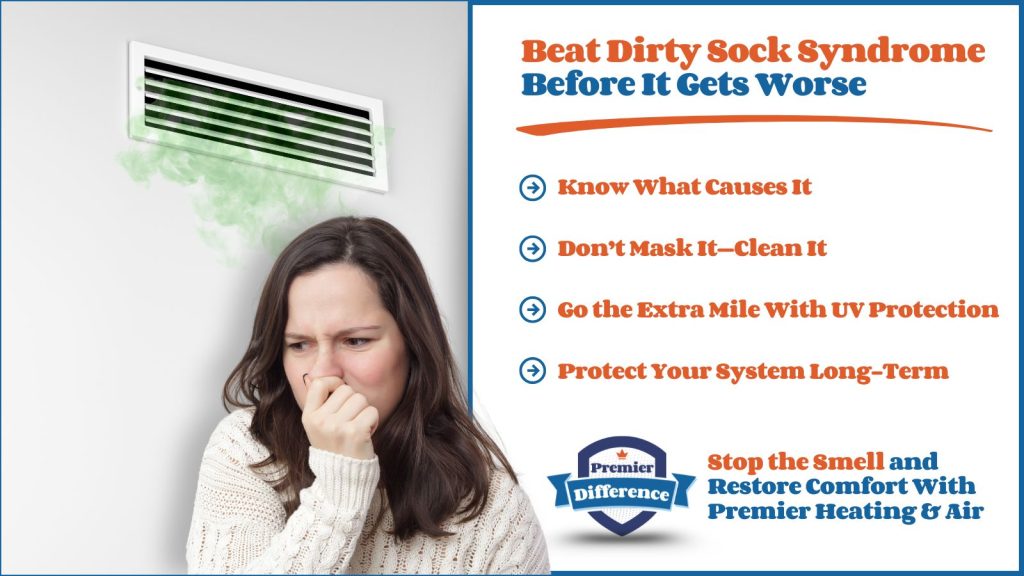If you’ve ever turned on your air conditioner and been hit with a musty, moldy, gym-sock-like smell, you’re not imagining things—and it’s not just a nuisance. You’re likely dealing with something HVAC professionals call “Dirty Sock Syndrome.” The good news? Dirty Sock Syndrome is a common—and fixable—problem. Let’s take a closer look at what causes it, why it affects your AC system, and how our team can help you eliminate it for good with AC repair Dublin, GA.

What Is Dirty Sock Syndrome?
Dirty Sock Syndrome is exactly what it sounds like: a foul odor coming from your AC that smells like dirty, sweaty socks. It usually happens when you first switch your heat pump or air conditioning system from heating to cooling mode, especially during the spring or fall when temperatures fluctuate.
The smell originates from bacteria and mold that build up on the indoor evaporator coil inside your air handler. When warm, moist air from your home passes over this coil, it can trigger the release of these foul-smelling compounds into your ductwork—and right back into the air you’re breathing.
Here’s how it happens:
- Moisture accumulation: When your AC runs, it pulls humidity from the air, which condenses on the evaporator coil. This moisture should drain away, but if it doesn’t, it lingers and fosters microbial growth.
- Dust and debris buildup: Dust, pollen, pet dander, and other particles settle on the coil. When combined with moisture, they provide food for bacteria and mold.
- Temperature changes: Switching between heating and cooling modes can encourage bacteria to grow and thrive, especially in spring and fall.
- Poor airflow or maintenance: If your filters are dirty or your system isn’t getting regular maintenance, airflow can be restricted, and moisture may not be properly managed—leading to an even greater chance of problems.
What Can You Do About It?
You don’t have to live with that sour, sock-like smell—and you shouldn’t. Dirty Sock Syndrome can not only make your home unpleasant, but it can also be a sign of poor indoor air quality or an AC system that’s not running efficiently. Here’s what we recommend:
1. Schedule a Professional Cleaning
The first step is to have your evaporator coil professionally cleaned. This removes the mold and bacteria buildup and restores cleaner airflow. At Premier Heating & Air, we use specialized, safe coil-cleaning agents to thoroughly sanitize your system without causing damage.
2. Install a UV Air Purifier
To prevent the problem from coming back, we often recommend adding a UV-C light purifier near the evaporator coil. These lights kill bacteria, mold, and viruses before they can grow or spread—keeping your AC cleaner and odor-free.
3. Upgrade Your Air Filter
If your current filter isn’t capturing enough debris, we can upgrade you to a higher-efficiency filter. This helps keep dust and organic material off the coil and improves overall indoor air quality.
4. Keep Up With Regular Maintenance
Regular HVAC maintenance is your best defense against Dirty Sock Syndrome. During seasonal tune-ups, our technicians check for moisture buildup, clean the coils, inspect the drain pan, and make sure your system is running at its best.
Let Premier Heating & Air Help You Breathe Easier
At Premier Heating & Air, we believe your home should always smell fresh and feel comfortable. If you suspect Dirty Sock Syndrome is affecting your air conditioner, don’t wait for it to get worse. Contact us today to schedule an inspection and get your AC system back in top shape.
With the right combination of cleaning, prevention, and professional care, we’ll make that stinky sock smell a thing of the past—so you can enjoy clean, cool air with confidence.


